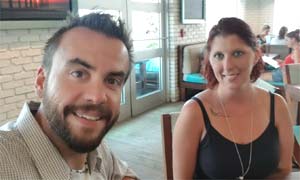10 Positive changes to take your life to the next level
Your comeback will always trump your worst setback
 In 2017, almost to the day, I was 41, a newfound bachelor, in poor health, addicted to tobacco, and drinking way more alcohol than I should’ve. My first marriage had come to an abrupt end, and I felt I had been thrown away. This post isn’t about the details of my first marriage or even the “if I had only…” kind of relationship advice. But simply to indicate a starting point for the positive changes I used for my comeback.
In 2017, almost to the day, I was 41, a newfound bachelor, in poor health, addicted to tobacco, and drinking way more alcohol than I should’ve. My first marriage had come to an abrupt end, and I felt I had been thrown away. This post isn’t about the details of my first marriage or even the “if I had only…” kind of relationship advice. But simply to indicate a starting point for the positive changes I used for my comeback.
Some quick backstory
I grew up a middle-class only child. I had no interest in sports and was never part of the popular crowd at any point in my life. Like most kids, it seemed my friends had better Christmases, took cooler vacations, and generally lived more extravagant lives. School was pretty boring, and I got decent grades for barely paying attention. It wasn’t until after college and being an adult on my own that I really seemed to figure out who I was.
Like most men, my 20s, especially my early 20s, were my prime. I was reading every self-help book I could get my hands on. Physical fitness became a huge part of my life. I strived to climb the ladder as fast as I could in my career. I dabbled in every entrepreneurial venture and side hustle I could find. The books I was reading said millionaires were forged in hard work, and I desperately wanted to be a somebody.
Success came from my hard work. I had a decent place, drove a very nice car, and my debt was eroding. All while partying virtually every night, functioning on beer, pizza, tacos, candy, and barely sleeping.
Last call: when the lights came on and the music stopped
Somewhere in my late 20s and into my 30s, my metabolism gave out. At that point, I was a husband, a parent, and a cofounder of a business. I still did my side hustles and even kept a part-time job because I wanted to be a great provider. Eventually, I broke ties with my business partners and decided to go back to school to try a new career. Going to school at night while working a full-time construction job and juggling a family had its challenges. Once I graduated from college the second time, I started climbing the new career ladder as quickly as I could.
My 30s were a decade spent becoming very unhealthy. Most likely, it came from a lack of sleep. Not having time for exercise, stress, and bad food decisions didn’t help. Caffeine held me at 100% all day, tobacco kept me focused and calm, then every night, alcohol put me to bed.
My 40s were my metamorphosis
 My first marriage ended in my early 40s. I thought I did everything right. I worked myself into the ground being a family man and a provider at the sacrifice of my health. Instead of the fantastic life that was promised, I was alone and a broken man. Family and friends’ lives went on as if they were living the ideal life.
My first marriage ended in my early 40s. I thought I did everything right. I worked myself into the ground being a family man and a provider at the sacrifice of my health. Instead of the fantastic life that was promised, I was alone and a broken man. Family and friends’ lives went on as if they were living the ideal life.
I kicked off my early 40s lonely, morose, and looking out from the haze of a liquor bottle. Thankfully, some good friends really stepped up and helped me through my dark times. They gave a message of hope: My story doesn’t end as Tim, the shaggy, frumpy, depressed, drunk, who was on the edge of being unemployed. I would find love and be happy with my life again.
But the kind of women I was interested in would not be interested in the person I had become. Hard work was in my DNA, and it was time I started investing in me. I needed to heal from everything I had been through and what I had done to myself.
If you are in a sullen and dark place like I was, or you’re full of drive and looking to go from 100% to 110%, here are 10 positive changes for life I used to do a complete 180 from the path I was going down.
Master Sleep
I came across a guy called Shawn Stevenson. He talked about how sleep is often underrated, but it’s the ultimate cheat code for success because it directly impacts cognitive function, emotional regulation, and physical health. Without adequate rest, your brain can’t consolidate memories or solve problems effectively, leading to diminished productivity and increased errors. Once I started to aim for 7-9 hours per night, weight loss became possible. All the sudden, I was way more effective at work.
Create a sleep-conducive environment—dark, cool, and quiet—and stick to a consistent schedule. Research shows that quality sleep enhances focus and decision-making, allowing you to perform at peak levels during waking hours. It’s not just about quantity; incorporating practices like avoiding screens before bed and managing stress can transform your energy levels, making every other success strategy more effective.
Build a Daily Routine
Establishing a solid daily routine is like programming your life for automatic wins, as it minimizes decision fatigue and ensures consistent progress toward your goals. I had a “Minimum Viable Day” that included non-negotiable habits before I could call it a day. I have to get some exercise, do any kind of self-improvement, and spend some time talking to God.
Over time, these routines compound, turning small actions into significant achievements. Walks turned into running. I alternated running and weight lifting. My distances got further and further. I started lifting more and more. Creating these positive behaviors freed up mental energy for creativity and problem-solving at my job, ultimately accelerating my comeback.
Embrace Optimism
 I made the conscious decision I was going to be happy instead of bitter. One of the friends who helped pull me out of my funk even complimented me on how far my attitude had come. Optimism isn’t naive; it’s a strategic mindset that fuels resilience and attracts opportunities. Maintain a positive outlook—even if it meant selectively ignoring negatives—I was motivated and open to possibilities that the old me would have missed. Also, practice gratitude, surround yourself with uplifting influences, and use the mindset that failures are learning experiences.
I made the conscious decision I was going to be happy instead of bitter. One of the friends who helped pull me out of my funk even complimented me on how far my attitude had come. Optimism isn’t naive; it’s a strategic mindset that fuels resilience and attracts opportunities. Maintain a positive outlook—even if it meant selectively ignoring negatives—I was motivated and open to possibilities that the old me would have missed. Also, practice gratitude, surround yourself with uplifting influences, and use the mindset that failures are learning experiences.
In essence, being bullish about the future is a self-fulfilling prophecy.
A Growth Mindset
Optimism and growth dovetail into each other. Having a growth mindset is the belief that abilities can be developed through dedication and hard work. This is the mindset that turns obstacles into stepping stones. This perspective encourages embracing challenges and learning from criticism. Praise effort over innate ability, seek feedback, and treat failures as data points for improvement.
Be Comfortable with Rejection
Rejection is inevitable on the road to success, but treating it as a muscle to strengthen can turn it into a powerful advantage. I have two fancy pieces of paper from two different colleges that say I’m smart. It doesn’t matter the degree – I am and have always been a salesman. When I was ready to step back into the dating scene, a sale was being made: I sold a lady on dating me, or she sold me that I didn’t measure up.
High achievers break through, enduring numerous “nos” before a “yes.” Getting what you want is a numbers game. By normalizing rejection, you not only improve your emotional resilience but also increase your chances of eventual triumph through sheer volume of attempts.
Set SMART Goals
SMART goals—Specific, Measurable, Achievable, Relevant, and Time-bound—provide a clear roadmap, eliminating vagueness that derails many aspirations. Instead of vague thoughts like “get fit,” I told myself, “run a 5K three times a week by next month.” In reality, it wasn’t all running at first; the early 5Ks included some walking. However, this framework increases accountability and motivation by breaking big dreams into actionable steps. Remember the “A” in SMART and set realistic SMART goals.
Increase Your Intensity
While consistency builds the base, ramping up intensity in key moments separates top performers from the rest, accelerating results dramatically. This means pouring focused energy into high-priority tasks, like intense sessions at work, closing Outlook, and muting the phone or all-out sprints during a run, rather than coasting through. By strategically applying intensity, you compress timelines for achievements, but balance it with recovery to avoid burnout. Ultimately, this amplifies your output, turning good performance into exceptional.
Consistency
Intensity is a great tool, but consistency trumps in the long game of success. Small, repeated actions create habits that yield exponential results over time. Pick one thing and focus on constant improvement—whether in skills, health, or relationships—rather than burning out with trying to push everything forward. This approach leverages the power of compounding, where today’s minor gains build on yesterday’s, leading to massive growth.
Example: I needed to get my debt under control. My debt was spread across 4 credit cards. I made minimum payments on 3 and targeted the card with the smallest balance. If I had a surprise influx of cash, I would make an additional payment on the card. Soon, that card was closed and paid off, and the others started to fall like dominoes. By prioritizing steady progress, you build momentum that makes goals feel inevitable rather than overwhelming.
Leverage High-Impact Actions
When I was young and overflowing with ambition, I thought I had to be constantly hard at work. Success isn’t about doing more; it’s about doing the right things that yield disproportionate results with minimal input. Identify leverage points, like automating routines or delegating low-value tasks, to free up time for what truly moves the needle. The Pareto Principle suggests that 80% of outcomes come from 20% of efforts, so prioritize accordingly. All of the books I read have a common key: entrepreneurs and leaders excel by focusing on high-impact activities. They focus on the important stuff like networking or skill-building in core areas.
Network, network, network
Before moving to Florida, I had a vast network. Pretty much any challenge, I knew someone who was a pro or had been through it. A strong network is a multiplier for success, as relationships provide access to opportunities, advice, and resources beyond solo capabilities. It takes time, but approach networking genuinely to forge meaningful connections. My greatest successes (jobs, deals, opportunities, even dates) came from “who I knew” as much as “what I knew.”
My metamorphosis took roughly a year
 One year is all it took to become the person I am today. In 2018, a year later, I met the woman who, a few years later, became my wife. While getting to know each other, we talked at length about our lives leading up to meeting each other. We both spent our lives working hard, trying to be good companions to our partners, navigating horrible setbacks, and even sacrificing our health at the expense of previous relationships. Prior to meeting me, Faith actually created her own plan that was very similar to mine. Her metamorphosis took about a year, too. In a way, we both wanted to be worthy of the other – before we even met.
One year is all it took to become the person I am today. In 2018, a year later, I met the woman who, a few years later, became my wife. While getting to know each other, we talked at length about our lives leading up to meeting each other. We both spent our lives working hard, trying to be good companions to our partners, navigating horrible setbacks, and even sacrificing our health at the expense of previous relationships. Prior to meeting me, Faith actually created her own plan that was very similar to mine. Her metamorphosis took about a year, too. In a way, we both wanted to be worthy of the other – before we even met.


